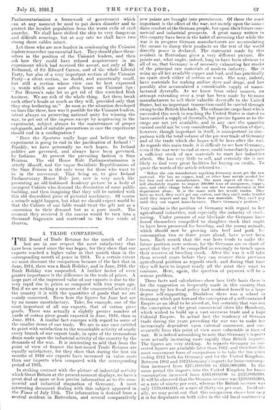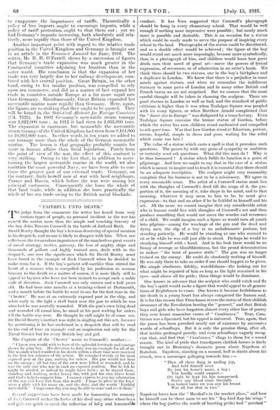A TRADE COMPARISON. .T HE Board of Trade Returns for the
month of June last are in one respect the most satisfactory that have been issued since the war began, for they show that our exports reached a higher value in that month than in the, corresponding month of peace in 1914. To a certain extent we must discount the comparison because of the fact that in June, 1914, there was a Bank Holiday, and in June, 1916, the Bank Holiday was suspended. A further factor of even' greater importance is the difference in the scale of prices. A. large part of the improved value of our exports is due to the: very rapid rise in prices as compared with two years ago. But if we are seeking a measure of the commercial activity of • the country it is with the quantities of goods that we are mainly concerned. Even here the figures for June last are • by no means unsatisfactory. Take, for example, one of the most important of all our exports, that of cotton piece • goods. There was actually a slightly greater number of yards of cotton .piece goods exported in June, 1916, than in 'June, 1914. A similar fact emerges with .regard to sonic of the smaller items of our trade. -tW' e are in any case entitled -to point with satisfaction to the remarkable activity of nearly every branch of our export trade, in spite of the tremendous :drain made upon the industrial activity of the country by the demands of the war. It is interesting to add that from the point of view of finance the last-issued Trade Returns are equally satisfactory, for they show that during the first six months of 1916 our exports have increased in value more than our imports when compared with the corresponding period of 1915.
In striking.contrast with the picture of industrial activity which-Great Britain at the present moment displays, we have a great deal of more or less precise information as to the com- mercial and industrial stagnation of Germany. A most interesting document dealing with this subject appeared in -the Times of July 11th. The information is derived from a neutral resident in Rotterdam, and several comparatively new points are- brought into prominence. Of these the most i important is the effect of the war, not merely upon the imme- diate comfort of the German people, but upon their future com- mercial and industrial prospects. A great many writers in this country have been in the habit-of assuming that while the war is in progress German manufacturers are accumulating the means to dump their products on the rest of the -world directly peace is declared. The statement made by this resident in Rotterdam gives a very different picture. • He points out, what ought, indeed, long to have been obvious to all of us, that Germany is of necessity exhausting her stocks of the principal raw materials of modern industry. She is using up all her available copper and lead, and has practically no spare stock either of cotton or wool. She may, indeed, have materials for making -aniline dyes and drugs, And has possibly also accumulated .a considerable supply of manu- factured dyestuffs. As we know from other sources, an attempt extending over a year has been made by German manufacturers to sell their valuable dyestuffs to the United States, but no important transaction could be carried through owing to the British blockade. The-submarine cargo-boat which succeeded this week in reaching the United States is stated to have carried a supply of dyestuffs, but precise figures .as to the cargo are not yet available, and in any case the quantity carried could not be very considerable. The question of dyes, however, though important in itself, is unimportant in com- parison with the total volume of the pre-war trade of Germany and of the trade which she hopes will be hers after the• war. As regards this main trade, it is difficult to see how Germany, even if the war were to end at once, could immediately acquire a sufficient stock of raw materials to start her industries afresh. She has very little to sell, and certainly she is not likely to find very great facilities for buying on credit. To quote the words of the article referred to :-- " Before she can manufacture anything Germany must get the raw
material. She has no copper, lead, or other base metals needed for her iron and steel manufactures. She must import all these. She will absolutely require to import 200,000 tons of manganese, copper, zinc, and other things before she can start her manufactures in this department alone. It is the same with her textile trades. They have no wool, they can't get any cotton, and they can't make textiles until they import and pay for these raw materials. They can't pay until they can export main factures. That's Germany's position."
Very-similar is-the position of Germany with regard to her agricultural industries, and especially the industry of stock - raising. Under pressure of our blockade the Germans have found themselves compelled to slaughter stock that ought to have been preserved for breeding, and the young animals, which should now be growing into beef and pork for consumption two or three years ahead, have never been born. Each month that the war lasts tends to make the future position more serious, for-the Germans arc so short of meat that they will be compelled increasingly to trench upon their reserves of breeding stock. After the war it will take them several years before they can recover their previous agricultural position as regards stock, and during that time they will have to import nearly all the meat they want to consume. Here, again, the question of payment will be a serious problem.
These facts and calculations show how little basis there is for the suggestion- so frequently made in this country that Germany by her fiscal policy had rendered herself to a large degree self-supporting. Doubtless there was a school in Germany which put forward the conception of a self-contained Empire as an ideal to be aimed at, but certainly that was not the conception of the great commercial cities like Hamburg, which wished to build up a vast overseas trade and a huge Colonial Empire. In actual fact the tendency of German trade during the years preceding the war was to make her increasingly dependent upon external commerce, and con- sequently from this point of view more vulnerable in time of war. It is indeed astonishing to note that Germany's imports imports. The actually increasing more rapidly than British mports. The figures arc very striking. As regards Germany no cor- rected figures are available later than 1912, and therefore the most convenient form of comparison is to take the ten years ending 1912 both for Germany and for the United Kingdom. Between 1902 and 1912 Germany's imports for home consump- tion increased from £277,000,000 to £.526,000,000. In the same period the imports into the United Kingdom for home consumption increased from £463,000,000 to £633,000,000. It will be observed that the German increase was £249,000,000, or a rate of ninety per cent, whereas the British increase was only £170,000,000, or a rate of thirty-six per cent. Incident- ally, we may point out that this comparison shows how easy it is for disputants on both sides in the old fiscal controversy to exaggerate the importance of tariffs. Theoretically a policy of free imports ought to encourage imports, while a policy of tariff protection ought to shut them out ; yet we find Gerinany's imports increasing, both absolutely and rela- tively, more rapidly than those of the United Kingdom.
Another important point with regard to the relative trade position in the United Kingdom and Germany is brought out in an article in the Economic Journal for June, 1916. The writer, Mr. H. H. O'Farrell, shows by a succession of figures that Germany's trade expansion was much greater in the Continental countries adjoining her frontiers than in the outer world. His conclusion is that the expansion of her trade was very largely due to her railway development, com- bined pith her central position. Great Britain, on the other hand, owing to her insular position, was compelled to rely upon sea commerce, and did as a matter of fact expand her trade in countries outside Europe at a far more rapid rate than Germany. Simultaneously, Great Britain expanded her mercantile marine more rapidly than Germany. Here, again, the figures are so striking that they ought to be quoted. They will be found in the Statistical Abstract for Foreign. Countries (Cd. 7525). In 1902 Germany's mercantile steam tonnage was 1,622,000 tons ; in 1912 it had risen to 2,655,000 tons. The expansion is enormous, but meanwhile the mercantile steam tonnage of the United Kingdom had risen frum 8,101,000 to 10,992,000 tons. In other words, in ten years we added to our tonnage more than the whole of the German mercantile marine. The lesson is that geography probably counts for more in human affairs than fiscal legislation. Purely from the point of view of the war, the effect of this contrast is very striking. Owing to the fact that, in addition to main- taining the largest mercantile marine in the world, we also maintain the most powerful Navy, we have been able to con- tinue the greater part of our external trade. Germany, on the contrary, finds hertelf now at war with land neighbours, France and Russia, which before the war were among her principal customers. Consequently she loses the whole of that land trade, while in addition she loses practically the whole of her sea trade owing to the British naval blockade.































 Previous page
Previous page